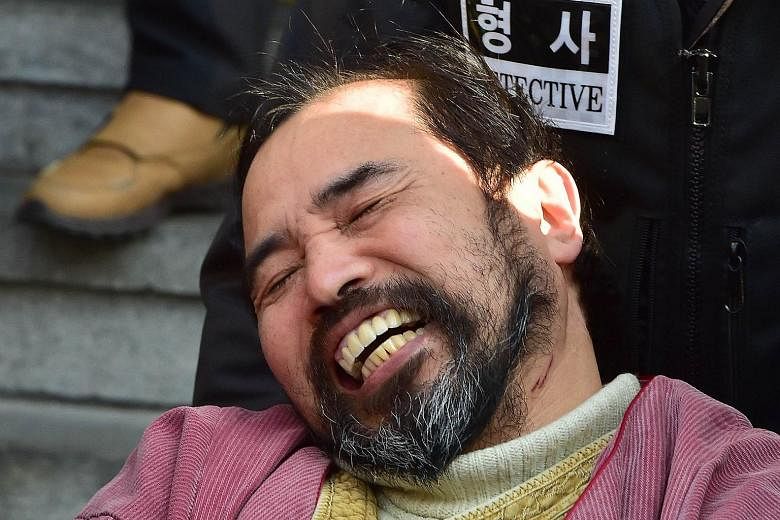SEOUL (AFP) - The man behind a shocking knife attack on the US ambassador to South Korea was convicted of attempted murder on Friday (Sept 11) and sentenced to 12 years for an assault that left the envoy needing 80 stitches to a deep gash on his face.
Prosecutors had sought a 15-year sentence for Kim Ki Jong, 56, who lunged at Mr Mark Lippert with a paring knife during a breakfast function in Seoul in March.
In passing judgement, the Seoul Central District Court noted Kim had "shown no repentance, attempting to justify his actions throughout the trial".
The public attack on the envoy of South Korea's most important military and diplomatic ally - and dramatic TV footage of Mr Lippert being rushed to hospital clutching his bloodied face - was shocking for a country where passionate political protest is common but acts of such extreme violence rare.
There was also a degree of shame and disquiet that a man with a record of violence against foreign envoys had been able to carry out such an assault.
A maverick activist who was known to police, Kim had been handed a two-year suspended sentence in 2010 for hurling a rock at the then Japanese ambassador to Seoul.
NO EMOTION
The defendant, wearing a blue prison outfit, closed his eyes but showed little emotion as the court verdict was read out.
He was then taken from the court in a wheelchair he has been using as the result of a leg injury sustained while being tackled to the ground after the assault.
Under police questioning, Kim said Mr Lippert was the "symbolic" target of his opposition to annual US-South Korea military exercises.
The joint drills always trigger a surge in tensions with the North and Kim argued they were responsible for blocking a resumption of inter-Korean dialogue.
While admitting the assault, Kim repeatedly denied any intent to kill the ambassador, insisting that his sole aim was to bring attention to his campaign against the military exercises.
The court acquitted Kim of separate charges filed under South Korea's strict National Security Law that bans any act seen as aiding North Korea or promoting its ideology.
Kim has visited the North seven times and once tried to erect a memorial in Seoul to the late North Korean leader Kim Jong-Il after his death in 2011.
North Korea rejected accusations that it may have been behind the attack on Mr Lippert as a "vicious" smear campaign, although the official KCNA news agency described the assault as "just punishment" for Washington's refusal to cancel the joint military drills.
Mr Lippert underwent two-and-a-half hours of surgery after the attack. While there was no irreversible nerve damage to his face, a separate cut to his left hand damaged the nerves of his little finger.
Putting the threat posed by North Korea to one side, South Korea has largely been untouched by the spectre of terrorism, domestic or external, and the assault led some to question whether it had become complacent in what can seem like an increasingly hostile world.

